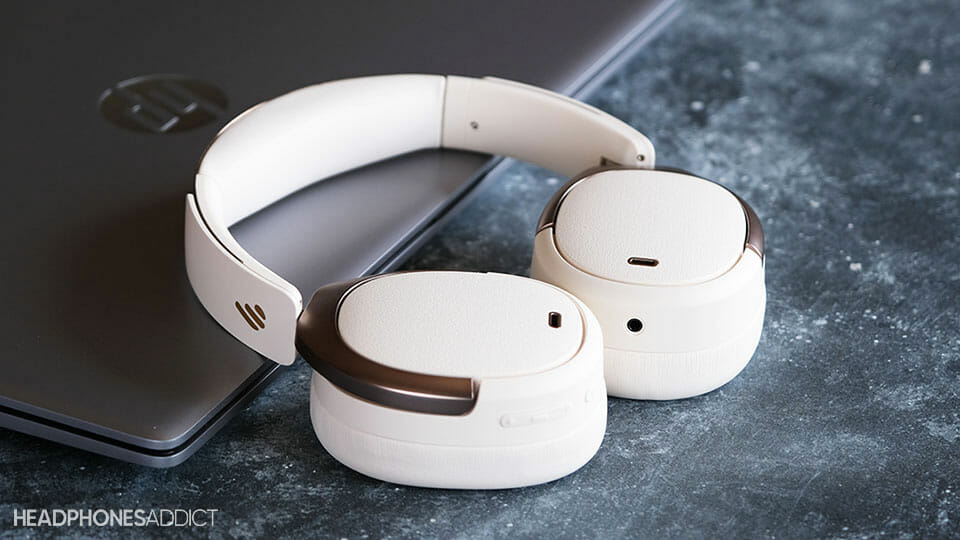
Edifier WH950NB are outstanding commuting headphones with lots of comfort and features. Their performance rivals the best. With some sound improvements, these could’ve been perfect.
The new Edifier WH950NB are flagship consumer-focused headphones with all the modern features you might want: ANC, ambient sound mode, EQ, multipoint, etc. More on that later.
They excel in other areas too. Like, call quality and battery life, making them an all-around fantastic pick for commuters, travelers, students, or office workers.
Sure with the price under $200, they come with a few shortcomings.
Let’s explore all the pros and cons in the full review.
- Clear sound quality with natural bass response
- Comfortable design with memory foam earpads
- Great active noise cancellation that rivals the best
- Fairly durable build quality with hard-shell carrying case
- Overwhelming number of features
- Limiting custom EQ settings
- Ineffective Game Mode
Sound

Edifier WH950NB have a sound quality worthy of their price. However, with a less pronounced peak in the midrange and more resolution in the treble, they could’ve been so much better.
Hear the sound signature below.
Edifier WH950NB A/B sound comparison:
Learn how to understand sound comparisons.
All Edifier headphones seem to have a specific “house” sound signature. At least the premium ones offer a neutral bass and balanced mids yet a sharp roll-off in the treble.
The latter is frustrating, especially since you can’t EQ it with the app’s custom equalizer. The result is a sound that doesn’t reach its full potential.
Edifier WH950NB frequency response

Bass: Almost neutral with some sub-bass kick
Low frequencies are pleasantly neutral for the most part. Lowering the 100Hz region by -2dB in the app completely flattens the bass.
Except for the sub-bass, where there’s a noticeable hump at 50Hz. That adds some rumble and makes the sound fuller as a result.
Bass kicks are precise and well-controlled, so you can easily listen to any music genre, from pop and hip-hop to rock and metal.
Despite being almost neutral, the bass on the WH950NB still adds some warmth, which most people enjoy.
Midrange: Pretty balanced but shouty at times
From 250Hz to about 2kHz, the midrange is flat. When listening to string instruments, including distorting electric guitars, they all sound as they should.
However, things recess a bit after passing 2kHz and above. Not a bit deal, but it does make the enormous peak at around 4.5kHz much more pronounced.
The latter, thankfully, doesn’t ruin the sound, but it does make vocals a bit shouty at times.
Strangely, custom EQ doesn’t let you fix these two dips and peaks, which is odd.

Treble: Clear but with hidden potential
Edifier WH950NB are by far the clearest-sounding headphones from this company (that we tested).
The peak at 8.5kHz adds a nice texture and crispness to the overall sound, with enough air, so the sound doesn’t feel congested.
However, with better tuning, these headphones could’ve offered so much more. A quick roll-off after 9kHz means you don’t get extra airiness and resolution that would make the sound more effortless.
Unfortunately, the custom EQ doesn’t help much, either. It’s very limiting in what it can do, so you can’t correct all the errors with it, let alone add more life to the sound.

Nonetheless, Edifier WH950NB are still pleasant to listen to, with a wide soundstage and fairly accurate imaging. It isn’t as immersive as in some in-ear headphones, but it’s okay for casual listening.
The WH950NB are most suited for casual listeners who want better audio quality without breaking the bank. However, these headphones might leave audio purists wanting a bit more.
Find similar headphones:
Comfort & Fit

Edifier WH950NB offer exquisite comfort thanks to its lightweight design and memory foam earpads. However, they can’t handle quick movements due to their gentle clamp force.
The new headphones from Edifier should be a role model for others under $200 on properly cushioning their headphones.
Edifier WH950NB greet your ears with thick memory foam earpads. They fit at least 3 knuckles, which confirms they can accommodate an average human ear.

The faux leather covering the memory foam is soft and surprisingly doesn’t make ears sweat. And that’s despite covering a larger surface than Sony WH-1000XM4.
Headband also gets a good amount of padding. It isn’t memory foam, but it’s soft, nonetheless.
Combined with somewhat gentle clamping force, these headphones should feel like a pillow on your head. Even if you wear glasses.

Speaking of gentler clamping force, headphones remain stable during regular head movements.
However, anything too rapid or leaning your head backward will make them move, potentially falling off your head. But the latter is unlikely to happen.
Overall, Edifier WH950NB are excellent for commuting and everyday use in general. On the other hand, they aren’t the best for active people looking for music on the run or at the gym.
Also check:
Durability

Edifier WH950NB are made with nice-feeling plastic and reinforced metal parts in the hinge and headband. You can even replace worn-out earpads. But they lack an IP rating, so you shouldn’t use them at the gym.
When paying nearly $200, you should already expect quality headphone materials. For the price, Edifier WH950NB definitely deliver.

Headphones are predominately plastic, with a soft, premium feeling finish. There are no rattling noises when you shake the headphone.
Ear cups have a textured surface similar to leather, but it’s just an imprint in the plastic, not a different leather-like material.
For added flexibility and rigidity, the headband has an exposed piece of aluminum (similar to Anker Soundcore Life Q30 and Life Q35).
You find another metal piece in the hinge for the folding mechanism. Instead of the usual clicking feedback when folding earcups, the one in WH950NB provides a smooth yet firm motion.

Earpads are made of faux leather that’s incredibly soft to the touch. It’s stretchy but feels like it might tear with enough force.
Any residue of sweat or hair products that dry on the earpads makes them crack. It’s best to keep the earpads and headphones clean, but sometimes you need to replace them.
Fortunatelly, it’s easy to replace the damaged earpads on the WH950NB. A snap-on plastic ring makes it a breeze, no glue is needed.
P.S. At the time of writing, Edifier doesn’t offer replacement ear pads, so we can’t comment on their price.

Lastly, headphones come with a hard-shell carrying case. It has 2 flaps inside to prevent earcups from scratching each other. Note that one flap isn’t attached to the case, so you can easily lose it.
Overall, the only thing that holds them away from getting a full score is an IP rating. While it isn’t important for casual use, it makes them unsuitable for sweaty activities.
Battery

Edifier WH950NB battery life clocked at 32 hours and 10 minutes, which is great but far from the best we’ve seen in Bluetooth headphones. At least you charge them up very quickly, adding 7 hours of juice in just 10 minutes.
Edifier WH950NB Battery Comparison

Edifier headphones are no strangers when it comes to long battery durations. Their Edifier W830BT promise an astounding 95 hours of playback time.
The WH950NB can only do a third of that (or a half, depending on whether you enable ANC or not).
Battery life test results:
In our battery life test with 50% volume and active noise cancelling enabled, we got:
- 32 hours and 10 minutes of music playback.
That’s still a long duration for premium headphones, although modern wireless headphones can last longer.
Disabling ANC should boost the battery life up to 55 hours. However, since ANC helps improve audio performance, we advise you to keep it on.
On the flip side, a fast-charging capability quickly brings the empty headphones back to life.
- You can expect extra 7 hours of battery life from a mere 10-minute charge.
Features

Edifier WH950NB can do pretty much all. Apart from ANC, multipoint, and other features, you also get a feature-rich companion app with lots of customizability.
A higher price usually means more features. Edifier didn’t hold back. They put many features in the WH950NB.
Apart from “standard” ones like active noise cancellation and ambient sound mode, there are many more in the mobile Edifier Connect app.
In there, you gain access to:
- Custom controls
- Custom audio equalizer
- Multipoint
- LDAC
- Shut-off timer
- Max loudness limiter
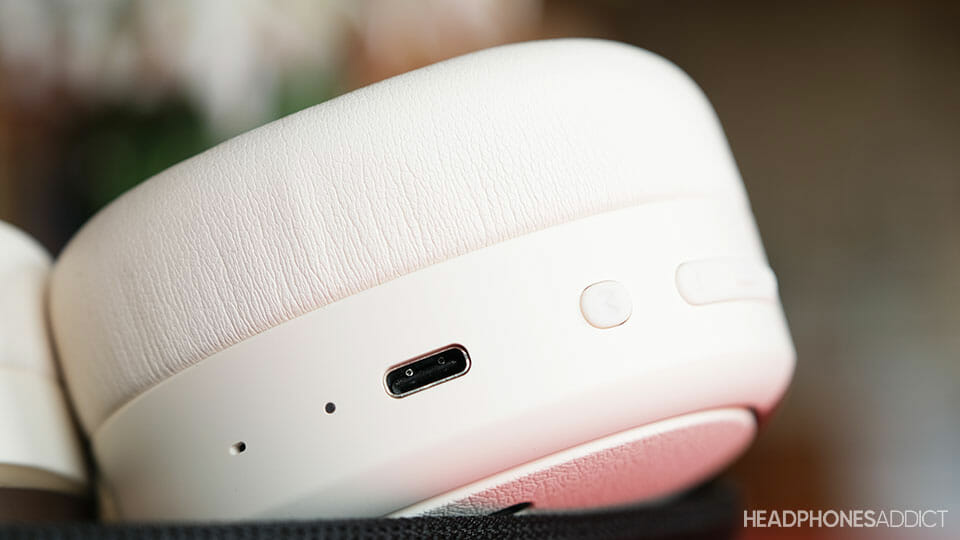
Controls
You get a standard 3-button layout that controls music playback, volume, and the ability to turn on and off the headphones.
Beneath, there’s an “M” button (which stands for “multifunction”), which you can customize. Sort of.
Single, double, and triple presses are predetermined, and the only thing you can customize is which settings you want to cycle through.
For example, with a single press, you can decide whether you want to cycle between only ANC on/off or also add Ambient sound mode in the cycle.

Custom audio equalizer
Edifier has its take on the equalizers, giving you 4 frequency bands limited to a specific region.
For example, one band only covers frequencies from 5kHz to 10kHz, and you decide how wide your boost will be by selecting the Q factor.

The great thing about Edifier’s approach is that all EQ settings get saved in the headphones. Meaning that the selected EQ also works when using headphones on a laptop, TV, etc.
On the other hand, it seems like the EQ doesn’t do much. Based on frequency response measurements, the differences after EQ-ing are minimal.
Loudness limiter
Similar to headphones for kids, Edifier WH950NB are among the few headphones for adults with a loudness limiter.
Unlike with headphones for toddlers, you can leave this feature disabled if you don’t need it.
Nonetheless, after some tests, we learned the headphones go way beyond the 85dB target loudness. We tried white and pink noise, even our standard “Baby Shark” song, and still got 5dB louder results.

On the other hand, the limiter does lower the actual max volume, so it can still be a helpful tool to prevent yourself from going too far and causing hearing damage.
We measured the loudness using calibrated MiniDSP H.E.A.R.S at 100% volume, with headphones connected to our laptop via Bluetooth.
Edifier WH950NB advertise to limit the loudness to 85dB max. Here are our results of the loudness test:
| Test | Maximum measured loudness |
|---|---|
| White noise | 92.8dB |
| Pink noise | 93.1dB |
| Music (“Baby Shark”) | 90.2dB |
| White noise (volume limiter OFF) | 102.4dB |
Microphone Quality
Edifier WH950NB has a great microphone. They wipe away almost all wireless headsets in terms of call quality.
Edifier WH950NB Microphone Test: Peaceful background: 0:00-0:39 – Noisy background: O:39-1:03
Headphones house 4 microphones and use signal processing to separate the background from your voice. And they do that with flying colors.
In a quiet place, your voice comes through with great clarity. You sound full and easily understandable, as if you’re speaking with a dedicated boom mic.
Furthermore, the quality remains unchanged when exposed to loud traffic noise. You might catch a minor distortion here and there, but in general, people won’t even know you’re walking next to a busy road.
The WH950NB easily beat even the best headphones that cost triple their price in mic quality. That’s outstanding.

Noise Isolation

Edifier WH950NB passively blocks ambient noise better than true wireless earbuds, significantly reducing the higher end of the spectrum. The low-end remains unchanged.
Regarding passive noise isolation, the WH950NB are better than your typical over-ear headphones, at least with mid-range and higher frequencies.

Headphones manage to block a significant portion of it, doing a much better job than some true wireless earbuds like EarFun Air Pro 3.
This performance proves itself useful when enabling active noise cancellation. More on that later.
On the other hand, lower frequencies below 200Hz are harder to block, so they remain unchanged.
Noise Cancelling

Edifier WH950NB take the already great passive noise isolation and additionally reduce lower frequencies by more than 40dB, leaving you with pleasant quietness.
ANC is great; hear the difference below.
Edifier WH950NB active noise cancelling test
The active noise cancelling performance of the WH950NB rivals the best headphones on the market.
While they could use a bit more reduction power in higher frequencies, headphones reduce the sound evenly and without any pressure sensation or background hiss.
You can toggle between high and low noise cancellation modes, depending on how much ambient noise you want to block.
Furthermore, there’s a wind reduction feature, which makes outdoor ANC usage slightly more bearable.

What about ambient sound mode?
The ambient sound mode has various intensities, but for the best results, you should leave it at +3. However, even at that value, you don’t get a true-to-life ambient noise amplification.
Everything sounds somewhat dull, unlike Apple AirPods Max‘s crispy Transparency mode. But that’s an entirely different price point.
Nevertheless, you hear enough of the outside world to reply to someone next to you quickly. But the performance doesn’t feel like you aren’t wearing headphones at all.

Bluetooth

Edifier WH950NB have a stable Bluetooth connection, average range, and can connect to 2 devices simultaneously. There’s also a Game Mode, which doesn’t do much.
Using Edifier WH950NB on a daily basis proved to be very reliable. Bluetooth 5.3 ensures a stable close-range connection with no random audio stutters.
Furthermore, the Bluetooth range is decent, too. In our indoor test:
- Headphones started stuttering after passing the second brick wall, which is around 45 feet away from the transmitting device.
- You gain a foot or two by disabling LDAC and using SBC or AAC codec.
Headphones also support multipoint, allowing you to connect to two devices simultaneously. It only works when you disable LDAC, so keep that in mind.
How to pair Edifier WH950NB?
- Since headphones support the Google Fast Pair feature, simply enable Bluetooth on your Android smartphone, and you should receive a bubble asking you to connect.
- Otherwise, turn on the headphones and hold the power button until you hear “pairing” from the speaker.

What Bluetooth codecs do they use?
Edifier WH950NB use SBC, AAC, and LDAC audio codecs. Make sure to disable multipoint to gain access to LDAC codec in Bluetooth settings.
Interestingly, AAC Bluetooth codec isn’t supported on the official website, yet it’s available to use in Developer options.
Is there an audio lag?
Headphones manage to sync audio with video perfectly, at least on YouTube and various social media apps.
On the flip side, you get a bit of delay in mobile games. Unless you’re into competitive shooters, the lag is manageable.
Strangely, headphones support low latency mode, but it doesn’t reduce the lag at all.
Should You Get Edifier WH950NB?

For the price of $180, Edifier WH950NB offer everything premium wireless headphones should offer. Minus some gimmicky experimental features that come in a few more expensive models that you don’t really need.
They’re all around nicely looking, great performing wireless headphones with strong features and excellent comfort. If only Edifier added a bit more air to the upper treble.

If you’re looking for comfortable headphones with excellent active noise cancellation for commuting, studying, or just listening to music in peace, these are suited for you.
On the other hand, if you’re mostly listening to music at the gym or seek audiophile-grade sound, skip these entirely.
How do Edifier WH950NB compare to the competition?
- They have slightly better sound quality than other Bluetooth headphones at around $180.
- WH950NB offer a slightly more premium build with generous padding from all sides.
- They offer more features inside a companion app and are more customizable.
- Battery life is better than with competition, lasting up to 55 hours without ANC.
- They have replaceable earpads like most wired over-ear alternatives under $200.
- Custom EQ is more limiting that EQ’s from the competition.
Edifier WH950NB alternatives
Treblab Z7 Pro
Headphones offer a pleasing, balanced sound signature emphasizing warmth, but the audio quality isn’t on par with the WH950NB.
Furthermore, their ANC isn’t as impressive as Edifier’s, nor is the Ambient sound mode. Also, you don’t get any app for customization.
Thankfully, they’re both comfy and well-built, with long battery life. The Z7 Pro are actually better for sports due to an IPX4 sweat resistance.
What’s in the Box?

- Edifier WH950NB Bluetooth headphones
- Hard-shell carrying case
- USB-C charging cable
- 3.5mm to 3.5mm audio cable
- Airplane adapter
- User manual
Specifications
| Type: | Over-ear |
| Connection: | Bluetooth 5.3 |
| Back design: | Closed-back |
| Drivers: | 40mm dynamic |
| Frequency range: | 20-40.000Hz |
| Impedance: | n/a |
| Weight: | 10.3 ounces (296 grams) |
| Mic & Controls: | Yes |
| Water resistance: | None |
| Battery life: | 34h (with ANC), 55h (without ANC) |
| Charging time: | 1.5h – quick charge – USB-C |
| Active noise cancelling: | Yes |
| Bluetooth codecs: | SBC, AAC, LDAC |
| Wireless range: | 45 feet (13.7 meters) |
| Microphone: | 4 mics with ENC |

From a childhood fascination with sound, Peter’s passion has evolved into a relentless pursuit of the finest headphones. He’s an audio expert with over 5 years of experience in testing both audiophile and consumer-grade headphones. Quote: “After many years, I can confidently tell which headphones are good and which are terrible.” Find his honest opinion in his reviews.






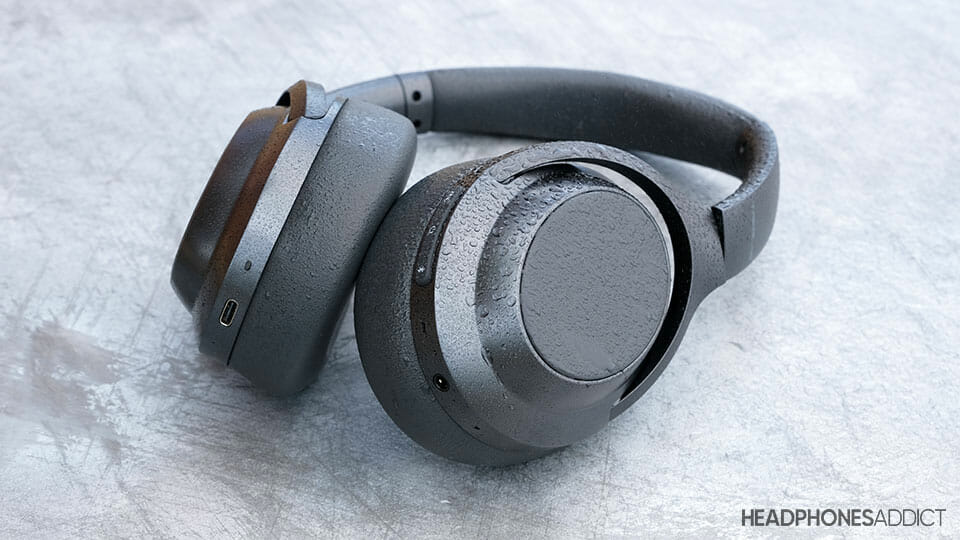
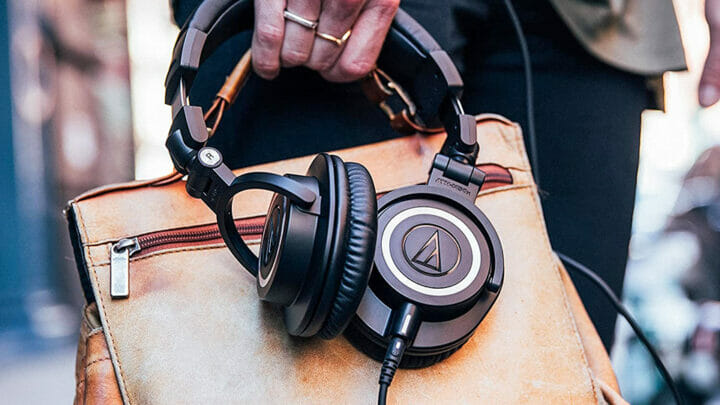

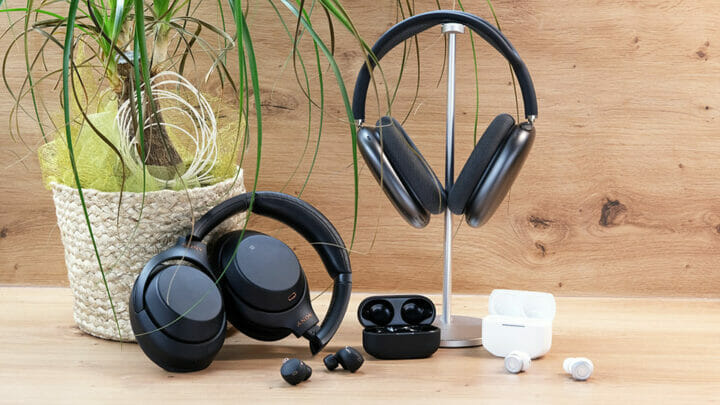
2 Comments
Ron
Noise isolation and ANC measurements are very nice and useful. However it would be even more useful if in each graph and each review there was also some kind of benchmark. For example Bose 45 for headphones and Apple Pro 2 for earbuds. This would make reading this graphs much easier for wider audience. People could just see if a line for a reviewed headphone is below or above the “best” available.
Peter Susic
I agree, that would be helpful. We have just started doing ANC measurements, and unfortunately, we don’t have a controlled enough environment to always get the same ambient noise results. Meaning that any future comparisons between new and old measurements could be misleading. We want to avoid that until we’re positive our data is consistently accurate.